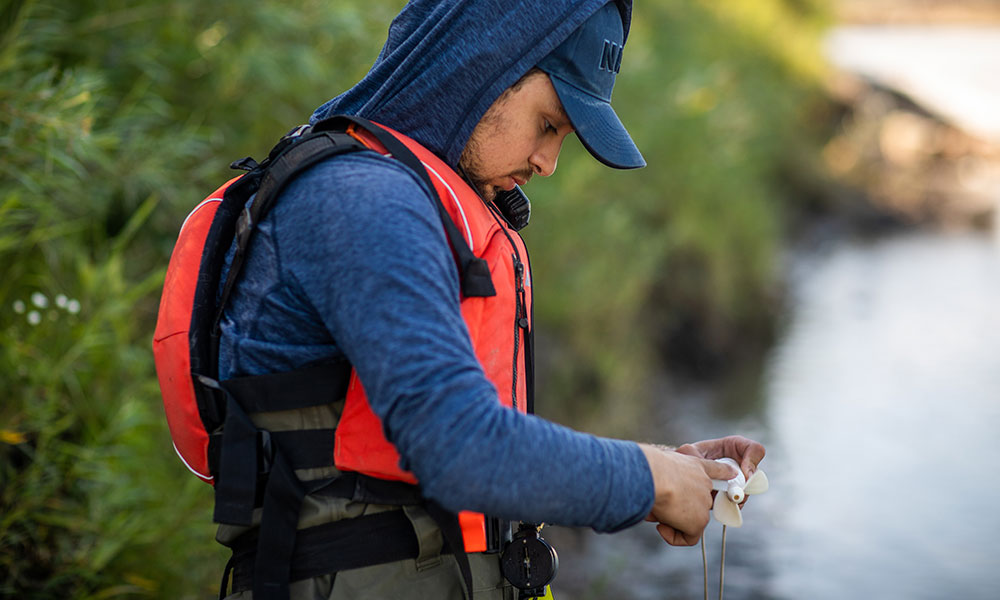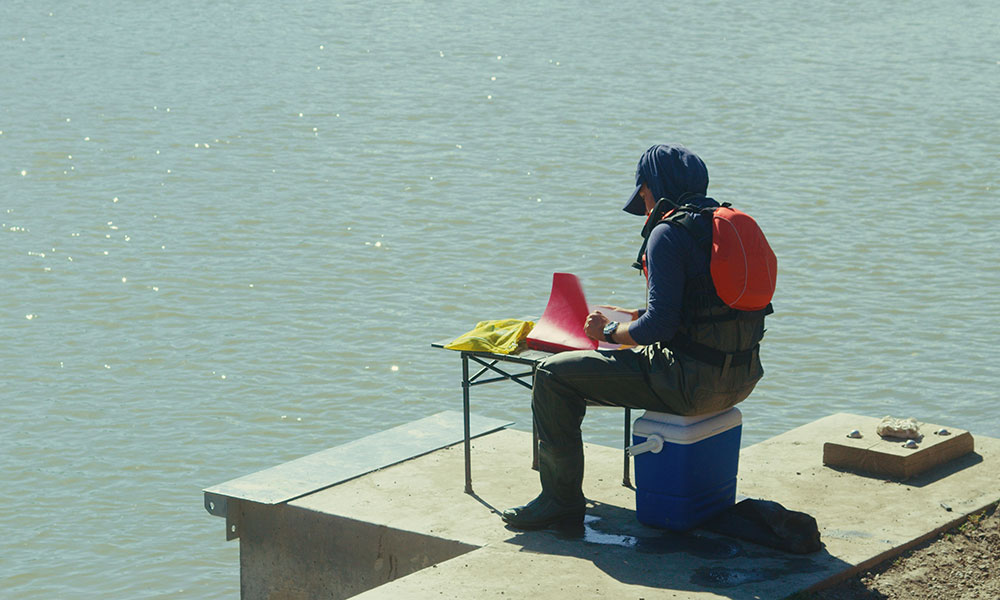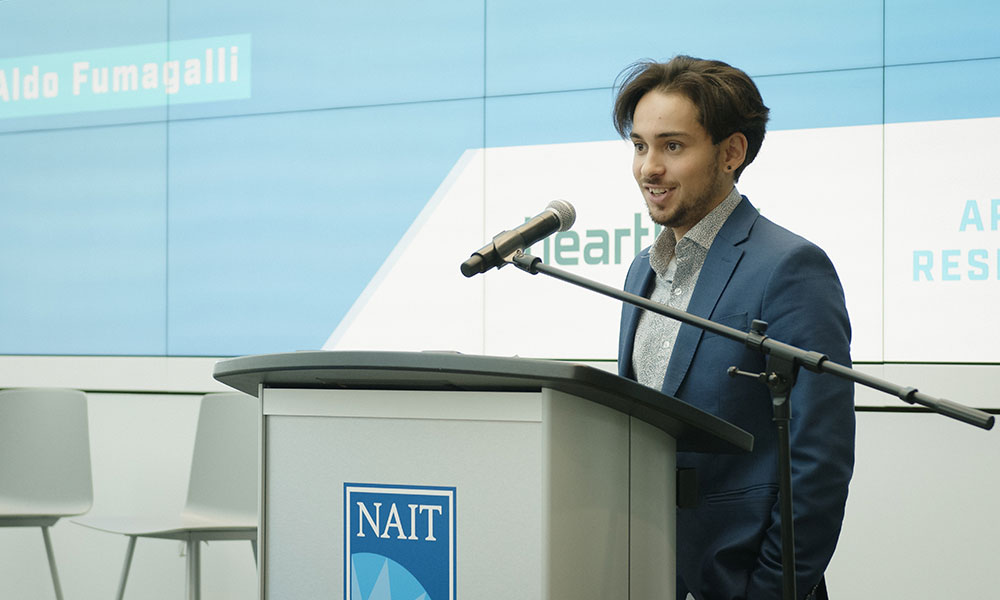Nanosystems diploma lands Aldo Fumagalli role on massive microplastics project
The curiosity Aldo Fumagalli (Nanosystems Engineering Technology ’23) has for science spans generations.
His grandfather was a genetic engineer in Guatemala, where Fumagalli grew up. In fact, he’d even contributed to the “Green Revolution,” an initiative to improve global crop yields and beat hunger.
The youth didn’t understand that at the time, but he remembers seeing his grandfather’s lab coats hanging around the house. To him, they represented a man who used science to delve into the unknown. Even then, Fumagalli admired that.
That feeling would stay with him, and even shape his future. In 2007, Fumagalli and his family came to Canada, where he’d eventually enroll at NAIT, keen on delving into the unknown himself – in this case through nanotechnology, the science and engineering of materials at the scale of the nanometre, or a billionth of a metre.
The discipline has applications in electronics, biochemistry, medicine, energy production and many other fields. NAIT’s Nanosystems diploma is the only one of its kind in Canada.
“I knew that this program would be the best way for me to be part of the scientific community, while exposing me to some of the newest types of technology,” says Fumagalli.
What he did not know when he started was that it would also open the door to a position at the polytechnic as a researcher assistant, working on one of the largest freshwater microplastics studies ever done in Canada.
A love for the lab

While it may be hard to imagine when working with invisible materials, hands-on education played a key role in Fumagalli’s success to date.
In fact, Fumagalli underestimated just how much he’d learn by doing – including how to work in the “cleanroom,” a high-tech space that uses extremely fine filters to maintain an environment free of contaminants that might otherwise ruin nanotechnology procedures and experiments.
“We were in the lab anywhere between 16 and 20 hours a week, which was something I didn’t expect to be doing so early in the program.”
Lab work fuelled Fumagalli’s curiosity, and he soon found himself reaching out to various program instructors looking for extracurricular opportunities to gain even more experience. Dr. James Gospodyn encouraged him to explore opportunities with NAIT’s applied research department, which often hosts student researchers.
Fumagalli ended up landing a yearlong co-op placement with the group.
“This is what I love about the program – all the instructors, who are experts in their fields, are invested in student success,” he says. “They were all so kind and giving, and I’m so grateful to them all.”
Leaving his mark

As part of NAIT’s Clean Technologies team, Fumagalli explored an emerging but significant environmental pollutant. Microplastics are particles less than five millimetres long that are found worldwide. They’re also in Edmonton’s North Saskatchewan River, where the young scientist spent roughly 60 days collecting water samples.
Fumagalli then spent much of the rest of his time in the lab extracting microplastics from those samples and purifying them for analysis by the research team.
“It’s a five-to-six-day process where you’re eliminating different particle contaminants,” he says. “It’s challenging and has little margin of error.”
Fumagalli was up for the task thanks to his lab work during the Nanosystems program. He was even able to fine tune the extraction method so that he and a fellow researcher could establish guidelines for use by future student researchers working on the microplastics project, and perhaps even by others in the field.
“Knowing that I played a role in refining the [extraction] method makes me so proud,” he says. “It’s humbling to know that as a student researcher I was able to make a difference and leave my mark.”
Comfortable and confident

That mark has led to Fumagalli joining the Clean Technologies team as a full-time research assistant, a role he started shortly after completing his final year of studies.
He’ll pick up the microplastics work where he left off as a student, bringing him closer to his goal of one day becoming a research chair exploring technologies and medical innovations to improve the lives of animals. It’s a field in which the techniques underpinning his work are coming into demand.
“Nanotechnologies are very much present in medication that help animals,” says Fumagalli. “I’d love to lead a research team that focuses on using this field of science to really make an impact on the world of veterinarian research and treatment.”
Fumagalli credits his time at NAIT for bringing him closer to that goal, whether that meant improving his skills in the lab or colleagues’ encouragement to present on his research despite his nervousness to do so.
“The experiences I’ve had have been an amazing surprise,” says Fumagalli. “I thought I’d leave NAIT with the technical skills to begin my career as a lab technician. But to leave here and enter into an actual research role is amazing.
“I’m so comfortable and confident with where my skills are at, and it’s all because of the experiences I’ve had in my program and during my co-op.”
Partly because of that, Fumagalli sees parallels between himself and his grandfather. The latter was “curious about the little known,” he says, “and used his passion for science” to explore it. He was a trailblazer in an emerging field of science, like Fumagalli would become as well. Even though his grandfather passed away years ago, Fumagalli believes he’d be proud.
“He would be so happy with what I’m doing.”
Collaborative action on plastic waste
Fumagalli's research is part of one of four projects underway through Plastic Research in Action – a collaboration between NAIT, InterPipeline and Dow Canada to advance the reuse and recycling of plastic in Canada and around the world. The 10-year, $10-million project launched in late 2019.